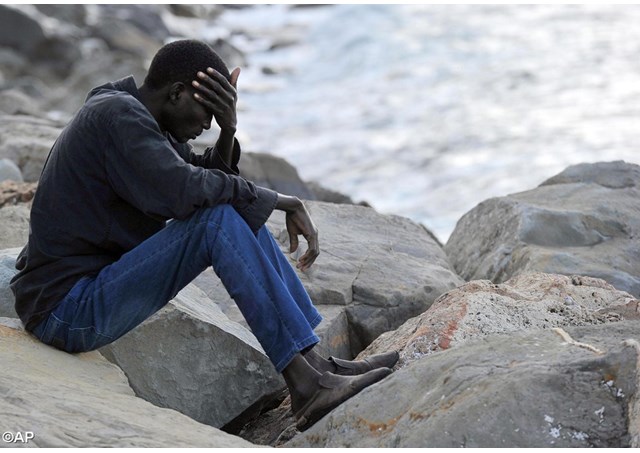
Europe not taking responsibility for vulnerable migrants

(Vatican Radio) Scores of African migrants have been forcibly removed by police at Italy's border with France, dashing their hopes of continuing their journeys further north and adding fuel to an ongoing humanitarian crisis.
The migrants, mostly from Sudan and Eritrea, had been sleeping in the open for five days when French border police refused to let them into the country after the Interior Ministry tightened border controls.
Italy, which has borne the brunt of rescuing migrants at sea and providing initial assistance to them, is demanding that other European countries take in the migrants and let them apply for asylum elsewhere.
Some 54,000 migrants have landed in Italy so far this year, according to refugee agencies. But many other EU nations are resisting an EU proposal to help.
Vatican Radio’s Linda Bordoni spoke to Christopher Hein, Director of the Italian Council for Refugees about the situation in Italy, which he says, is intimately linked to what is happening in the European Union.
Listen to the interview:
Christopher Hein says the current scenario is a direct consequence of what is happening in the EU, in North Africa and in the Middle East, and that it is important to understand that many refugees, who arrive in Italy by sea, do not consider Italy as their final destination, but simply as the nearest gateway into the European Union.
He explains that many of them have family or other links in other European countries and intend to go there, however the EU’s Dublin Regulation “makes it impossible to legally reach other destinations outside the first country of arrival: “This is the heart of the problem” he says.
The other problem – he continues – is that even if a person is recognized as having the right to refugee status or international protection, he or she is not allowed, at least for a period of five years, to establish himself or herself in another EU member state.
“So it is not only, under the Dublin Regulation, a question of where the asylum request is examined, but also where afterwards, the refugee is bound to live, and this of course is of great concern to those who have links in other countries” he says.
That is why – Hein explains – so many would-be-refugees try to enter countries bordering Italy. It is the reason, and not for the first time, of “the disastrous situation at the border” and the surrounding areas as the migrants are subject to controls in trains and buses as well.
He also points out that once they are rejected at the border many of them go back to the Central train Station only to try their luck again the following day, adding to the chaos.
All these facts “are a clear indication that there is no real asylum policy in the EU that is capable of managing this phenomenon” he says.
Hein remarks that following a recent emergency meeting of EU leaders after yet another migrant tragedy at sea, declarations, intentions and proposals to tackle the issue have been put forward but they remain words.
“Nothing has been decided by those who are responsible for taking decisions, and that means the Council of the European Union and the Governments of the member states” he says.
The only exception – he conceeds – is that the search and rescue operation coordinated by the Frontex Agency in the Mediterranean has been enlarged in its organizational capacities and in range, reaching as far as the territorial waters of Libya.
“This has saved thousands of lives in these last weeks and this is a positive step, but all the rest of this plan is words, and nothing yet put into practice” he says.
Hein also points out that in the Lisbon Treaty and in the EU Charter of Fundamental Rights the right to request and obtain asylum in the EU are fixed as a fundamental rights.
He says the Lisbon Treaty also includes the Principle of Solidarity between the member states of the EU with regard to other member states: “what is happening now is the contrary. Borders are closed, Bulgaria and Greece have erected physical walls towards Turkey, and proposals are going in the direction of making it even more difficult for asylum seekers and refugees to arrive in the EU with very few exceptions” he says.
“The overall scenario we are witnessing shows that the victims are the refugees and the asylum seekers, and it is clearly contrary to what is so solemnly laid down in the Lisbon Treaty” he says.
Hein points out that amongst those caught in the crisis are many vulnerable people: small children, pregnant women, sick persons and he says that from the humanitarian point of view it results in “an unbearable situation that these people have to spend the night in the open, on the beach, on the roads or around the train station.”
He says the only ones who are taking care of the migrants are voluntary organizations, some NGOs, the Italian Red Cross “but there is no response from the Institutions who are helpless in responding to the phenomenon.”
Hein concludes saying he still hopes to see coming from the European Parliament the proposal of a different direction and measures to be taken immediately.
He says the plan proposed by Italian Prime Minister, Matteo Renzi, to promote the “so-called mutual recognition of positive asylum decisions all over Europe could be an important step forward because it would allow the freedom of movement of recognized refugees all over the EU territory and this would help support people in their integration and in reaching their destination”.
For more information click here.for the Italian Council for Refugees.
| All the contents on this site are copyrighted ©. |


